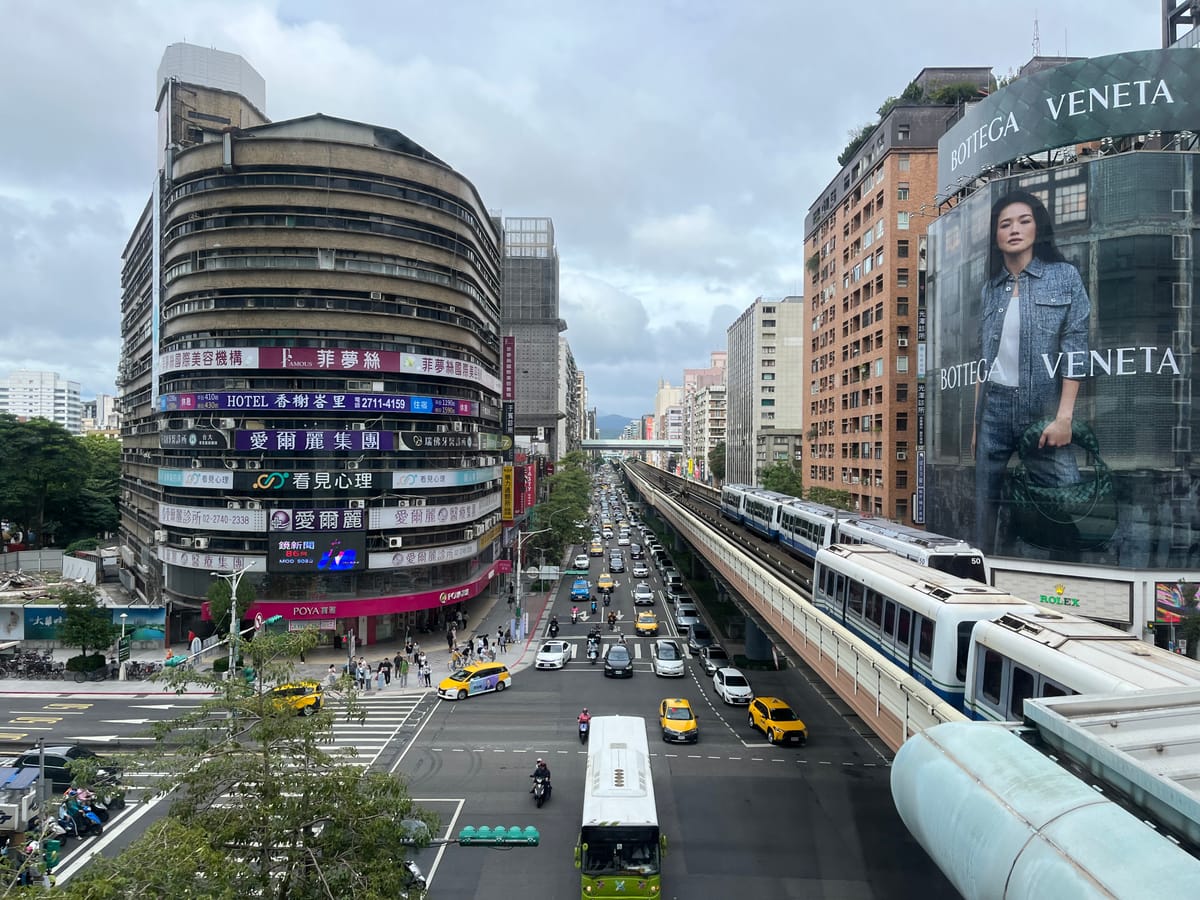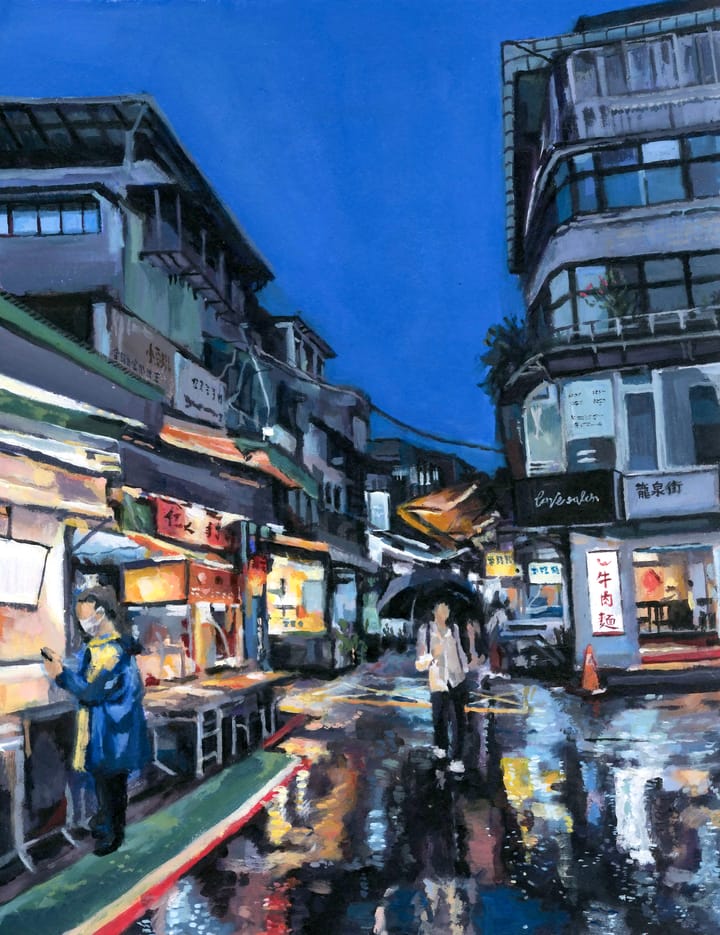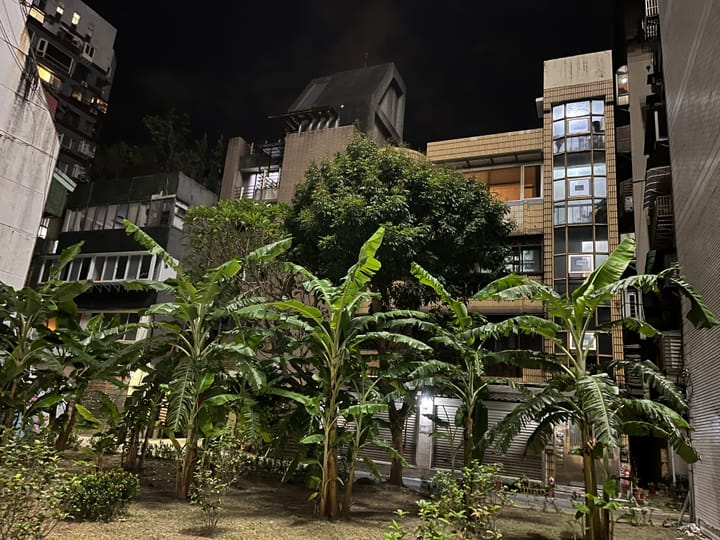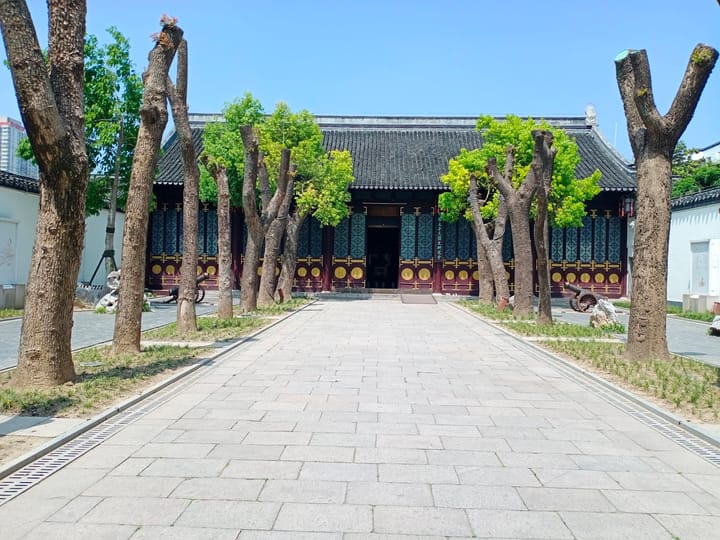#5 Five Things You Should Know About Taiwan

It has been over a month since you've heard from me, which proves all the haters right! Yes, it was pretty close to impossible to maintain a steady newsletter while studying abroad. To be fair, these past few weeks have been eventful: I finished my final exams, celebrated a wonderful DIY Thanksgiving with my housemates, did battle with a nasty viral infection—don't worry, Mom, I'm fine now!—and made plans for my December travels (Tainan, Kaohsiung, and Japan).
But now Christmas decorations are up in Taipei and I'm feeling especially reflective. When I was a journalist, December was a time of end-of-the-year lists, so I've been thinking about what mine might look like. Luckily, I did not have to ruminate on it for too long because, as a requirement for my summer U.S. government scholarship, I had to write a series of blog posts about my time in Taiwan. For my most recent one, I wrote "Five Things You Should Know About Taiwan."
I know that title makes it sound like some bizarre clickbait, but bear with me! Before coming to Taiwan, I definitely had more than a few misconceptions about everyday life here and the culture, customs, etc. As I've written about in this newsletter, there is only so much you can learn about a place as an outsider (especially as an outsider who can only passingly speak the local language).
But in my few months here, I have learned quite a few things about Taiwan. These are five that stuck out, though if you have some of your own (or corrections to make to mine), I'd love to hear from you.
Without further ado: Five Things You Should Know About Taiwan!
- Prepare to hold on to your empty coffee cup
Much like Japan, Taiwan has very few trash cans out on public streets, making it especially important to notice the few ones that do appear. Oftentimes, convenience stores like 7/11 or FamilyMart will have them as well, but you should expect to hold onto your empty boba tea for a bit longer than you might expect. On the positive side: Taiwan, which once had a horrific littering problem, now has one of the highest recycling rates of any country (and streets free of any lingering trash smell).
- The Taipei subway is great, but the buses are even better
Most people know the Taipei MRT by its sterling reputation. The 27-year-old subway system is as fast, clean, and convenient as everyone says, but the buses are the city’s superpower. If you come from a big U.S. city, you are probably used to the bus schedules changing on a whim, but in Taipei, the stations do a remarkable job of accurately recording wait times for the next available bus. Even better, there are almost always multiple options that reach the same destination.
A much harder aspect to quantify (but true at least to my experience) is the orderliness of it all. Even during peak times when each subway car is packed with people, lines tend to form naturally and almost no one is pushing or shoving. (In essence, imagine the exact opposite of the subway after Eagles games in Philadelphia.)
- The food is delicious and cheap, but only if you buy local
As a U.S. tourist, you'll be pleasantly surprised to find how affordable it is to eat out in Taiwan. Meals that might cost $20 a person in the United States can be as cheap as 300 NTD in Taiwan (the equivalent of $5-6). But generally that rule only applies if you’re eating local food—which, if you’re in Taiwan, you absolutely should! Some of the best beef noodle soup, braised-pork rice, and soup dumplings you’ll ever eat will only put you back a few U.S. dollars.
This rule unfortunately does not apply to international food, especially Western food. Though Taiwan has plenty of good pizzerias and American-style restaurants, their food is much more expensive and (at least in my limited experience) these places are more likely to tack on service fees and other costs that you won’t see at a local food stall. (Beef in general is a bit more expensive than other meat options. But you won't hear me complaining: pork-based dishes are great here!)
- Japanese influence is a big part of Taiwan culture
Everyday Taiwanese life has received plenty of influence from China and the United States, but many people don’t realize how strong a role Japanese influence also plays in Taiwanese society. (Japan, of course, colonized Taiwan for nearly 50 years before the island came under the control of the Chinese Nationalist Party, or KMT, after World War II.) You’ll notice this influence not only in the food and architecture of Taiwan, but also in the clothes people wear and the apps that they use. Most Taiwanese people use the Japanese messaging app LINE and, much like in Japan, take pride in their unique convenience store culture. Unlike in the United States, a 7/11 or FamilyMart is not just a place to buy snacks, but they even have kiosks to pay rent, add value to your Metro card, and buy tickets to a sports game (all things I've done at the local 7/11).
- Mandarin is not the only language people speak — learn a little Taiwanese too!
While most people you meet will speak Mandarin (and even a bit of English), Taiwan is a far more linguistically diverse place than most Westerners realize. Many people, particularly in the southern part of the island, speak Taiwanese Hokkien. You’ll most likely hear some Taiwanese slang interspersed with someone’s Mandarin and, at least if you’re in Taipei, announcements in Taiwanese on the subway (in addition to English, Mandarin, and Hakka).
Taiwanese Movie of the Week(s)
Ang Lee has directed profound (Brokeback Mountain), bewildering (Hulk), and sublime (Life of Pi) movies. His 1994 classic Eat Drink Man Woman stands out among that remarkable catalogue for a few reasons. For one, it is the only one of his films to be shot entirely within Taiwan, where Lee was born and raised. Set amid the bustle of Taipei, the film moves with the rhythm and stakes of a Victorian novel, covering all the mundane ups and downs of love, marriage, work, and food.
More importantly, it's a film that deeply relates to its characters, poking fun at their flaws while remaining devoted to their hopes and delusions. I especially found myself rooting for 老朱 (Lǎo Zhū), the retired chef and widowed father at the heart of the story, whose typical week revolves around preparing a marvelous dinner for his three daughters. Lǎo Zhū is losing his sense of taste—a cruel fate for a chef—and perhaps also losing a sense of what his daughters need from him at this stage in their lives. How the story eventually resolves is surprising, but perfectly in line with this character we come to know and love. If anything, he is responsible for this beautiful opening scene, which makes me hungrier than any episode of Chef's Table ever could:
Chinese Learning Corner
Once the new academic quarter starts in January, I'll be switching my textbooks from Simplified Chinese, the type of characters used in China since the 1950s, to Traditional Chinese characters, which were the standard before the 1950s everywhere and remain the standard in Taiwan. The vast majority of characters in both systems are nearly identical, but there are occasionally some striking differences. Here's an example of a sentence written in both Simplified and Traditional:
The original (in English): "I took a flight from Guangdong to Taiwan yesterday."
Simplified: 我昨天从广东坐飞机到台湾。
Traditional: 我昨天從廣東坐飛機到台灣。
Some characters, as you can see, are the same: 我 (wǒ, I) and 昨天 (zuótiān, yesterday). Others look roughly similar but with more strokes in the traditional version: 台湾 / 台灣 (Táiwān); 飞机 / 飛機 (fēijī, airplane). The hardest characters (at least for me) to recognize in Traditional Chinese are ones like 广 / 廣 (guǎng), which looks much busier than its simplified version.
Most Chinese language learners in the West default to learning Simplified because of its relative ease and use in China, but anyone attempting to read Chinese literature before 1950 (or any Taiwanese novels or news) needs to gain some fluency in Traditional characters. I was resistant to making the change, but it certainly is hard to be in Taiwan, surrounded by Traditional characters, and not want to learn. We'll see how I feel after a week of suffering through some longer, tougher class readings.
Odds and Ends
1.
Enough ink has been spilled in the past week about Henry Kissinger that I feel little need to join in. Though, if you're interested, I recommend reading Spencer Ackerman's obituary of the former statesman in Rolling Stone, which in Spencer's inimitable way, looks at the disastrous effect of Kissinger's policies in Southeast Asia and Latin America with the moral clarity that the topic deserves.
One thing I love about Spencer's writing—particularly in his book about the long shadow of 9/11—is how effectively he connects the misdeeds of the past to the misdeeds of the present. In Kissinger's callous disregard for Vietnamese, Cambodian, Bangladeshi, and Chilean lives, he gave a blueprint for U.S. policymakers in the 21st century to trample over Iraqis and Afghans in pursuit of "our national interests." As Spencer put it:
Forty years later, and likely as a consequence, U.S. presidents routinely bomb countries the U.S. is not at war with. They provide the barest minimum of disclosure that the bombs have fallen, and often not even that. When the U.S.’ declared wars fail, as they did in Iraq and Afghanistan, their architects and stewards blame the client militaries and governments they propped up. They cover their troop withdrawals with futile bombing campaigns that kill people so American statesmen can save face. Whether he realized it or not, when President Biden in July 2021 blamed the Afghans for losing the Afghanistan war — “the Afghan military collapsed, sometimes without trying to fight” was a typical line — he was reaching for Nixon and Kissinger’s template.
Plenty of journalists have laid out Kissinger's rap sheet. My former boss David Corn did a great version over at Mother Jones. But, given my obvious interest in Taiwan and China, I found myself thinking about the aspect of Kissinger's career that I previously respected most: his work normalizing the U.S. relationship with China.
Under Richard Nixon's supervision, Kissinger secretly reached out to Communist China during the height of the Cold War, securing a meeting in 1971 with Premier Zhou Enlai (a previously unthinkable development). The U.S. rapprochement with China did many people a whole lot of good, not least among them China's Communist leaders, who gained legitimacy on the world stage and crucial entry into international organizations like the United Nations.
There was far more to Kissinger's China diplomacy than meets the eye and this Politico piece unpacks some of his self-created myths. One that caught my attention involved Taiwan, which was sidelined as a result of the U.S. opening to China, leading to the bizarre state of Taiwan's international situation today—where it is not recognized by most states as a country and does not participate in major international organizations.
Kissinger long claimed that Taiwan "was only mentioned briefly" during his meeting with Zhou, but as Jim Mann wrote for Politico, that was not the case:
In 2002, the record of that Kissinger encounter with Zhou was declassified and released. It showed that, contrary to “barely mentioned,” the subject of Taiwan had taken up roughly the first third of the meeting. What’s more, Kissinger made crucial concessions during that discussion that have governed and constrained American policy toward China and Taiwan from then until the present day. Before Kissinger’s trip, the official position of the United States was that sovereignty over Taiwan was “an unsettled question.” But Kissinger promised Zhou that the United States would not support two Chinese governments (one in Beijing, one in Taipei); that it would also not agree to a solution of “one China, one Taiwan”; and, finally, that it would not support an independent Taiwan.
We can add Taiwan to the long list of people and places Kissinger saw as expendable in his pursuit of that elusive, U.S. national interest.
My favorite music from the past few weeks, in no particular order:
- "L'ultima notte" by Ariete, a wonderful Italian song that I first heard in Gusto Market, an Italian deli in Zhongshan District. My housemate Matt and I were able to score some delicious Italian snacks there (and hear some good music).
- "Neon Moon" by Cigarettes After Sex. I already adore the Kacey Musgraves version of this song with Brooks & Dunn, but this (much slower and moodier) cover hits harder than you think.
- "Ocean" by Jeena, who is an artist I've never heard of, but cannot wait to hear more from after this understated, beautiful song.
- So much Teresa Teng! (I am in Taiwan, after all.) My favorite, besides the immortal "月亮代表我的心" is her version of "何日君再來." But, I really need to explore more of her catalog.
This has been a mostly Philly-free newsletter, so I can't leave you all without a little taste from home. In honor of my upcoming trip to Japan, here's this tweet, which no less than 10 people all independently sent me. It reminded me of this Philly Mag article about a glut of cheesesteak restaurants in Lahore, Pakistan. Who knew Philly's cultural footprint was so vast? (I knew.)
In Tokyo there is a Philadelphia themed bar, which was set up because the guy who runs it loved Philadelphia soul music, and wanted to set up place that only played that. Eagles games on the TV, cheesesteak on the menu. pic.twitter.com/IL6UxwcFHu
— Mike Bird (@Birdyword) November 27, 2023
With that, happy holidays everyone!


